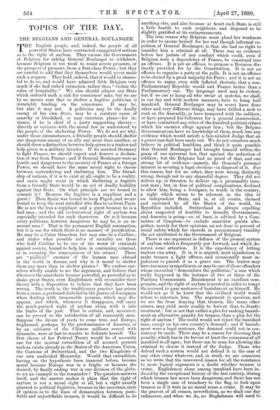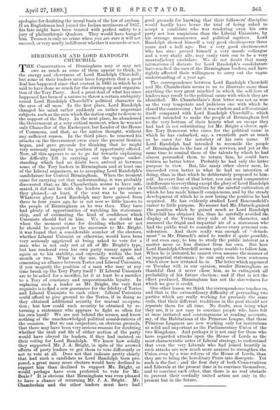TOPICS OF THE DAY.
1.HE BELGIANS AND GENERAL BOULANGER. THE English people, and, indeed, the people of all powerful States, have contracted exaggerated notions as to the right of asylum. They excuse the Government of Belgium for asking General Boulanger to withdraw, because Belgium is too weak to resist severe pressure, or the prospect of pressure, from a first-class Power ; but they are careful to add that they themselves would never make such a request. They hold, indeed, that it would be shame- ful to do so, and would have admired little Belgium very much if she had risked extinction rather than " violate the rules of hospitality." We also should admire any State which endured such a risk for conscience' sake, but we are by no means sure that to shelter a fugitive politician is invariably binding on the conscience. It may be, but also it may not. A politician may be the deadly enemy of his own State, may be a constant cause of anarchy or bloodshed, or may entertain plans—for in- stance, if he is chief of a party supporting slavery— directly at variance with the moral law as understood by the people of the sheltering Power. We do not see why, under those circumstances, a friendly people should shelter one dangerous enemy of an ally any more than another, or should draw a distinction between help given to a traitor and help given to a military invader. If we assisted Germany to fight France, we should expect and deserve a declara- tion of war from France ; and if General Boulanger were as hostile and dangerous to the security of France as a foreign Power, we should have the same moral right to choose between surrendering and sheltering him. The friend- ship of nations, if it is to exist at all, ought to be a reality, and cases might occur in which sheltering a fugitive from a friendly State would be an act of deadly hostility against that State. On what principle are we bound to commit it ? Because the fugitive is a suppliant and a guest ? Then Spain was bound to keep Pigott, and we are bound to keep the next swindler who flies to us from Paris. He is not the less a suppliant and a guest because he is a bad man ; and the old ecclesiastical right of asylum was especially intended for such characters. Or is it because every politician, however dangerous he may be, is an in- nocent man ? That is the permanent English assumption, but it is one for which there is no manner of justification. He may be a Caius Gracchus, but may also be a Catiline ; and under what possible rules of morality are those who hold Catiline to be one of the worst of criminals against society, bound to help him in continuing criminal, or in escaping the consequences of his crimes ? There are " political " enemies of the human race abroad in the world in dozens, and why is it moral to shelter them any more than to shelter pirates ? We confess our- selves wholly unable to see the argument, and believe that whenever the anarchists become powerful, so powerful as to shake great States, even Englishmen will reconsider their theory with a disposition to believe that they have been wrong. The truth is, the traditionary practice has arisen from a cause, a profound disbelief in the justice of foreigners when dealing with treasonable persons, which may dis- appear, and which, whenever it disappears, will carry the much-praised right of asylum along with it into the limbo of the past. That is certain, and, moreover, can be proved to the satisfaction of all reasonable men. Suppose the dream of poets to come true, and Europe, frightened, perhaps, by the predominance of America, or by an outburst of the Chinese millions armed with dynamite, were at last to resolve to federate herself. The first clause of her Federal Treaty would be of necessity one for the mutual extradition of all accused persons such as exists already in the States of the American Union, the Cantons of Switzerland, and the two Kingdoms of our own undivided Monarchy. Would that extradition, having on the hypothesis been immoral before, become moral because Europe was in a fright, or because she desired, by finally ending war in one division of the globe, to set an example to the remainder ? The question answers itself, and the answer makes it plain that the right of asylum is not a moral right at all, but a right usually granted to political fugitives, because in the uncertain state of opinion as to the lines of demarcation between justi- fiable and unjustifiable treason, it would be difficult to do anything else, and also because at heart each State is still a little hostile to each neighbour, and disposed to be slightly gratified at its embarrassments.
The true reason why Belgium must plead her weakness in order to excuse herself for her real though informal ex- pulsion of General Boulanger, is that she had no right to consider him a criminal at all. There was no evidence before her jurists of any conduct which could, even if Belgium were a dependency of France, be construed into an offence. It is not an offence to propose a Revision dis- tinctly provided for by the Constitution. It is not an offence to organise a party at the polls. It is not an offence to be elected by a great majority for Paris ; and it is not an offence to argue, even with inflated rhetoric, that a non- Parliamentary Republic would suit France better than a Parliamentary one. The language used may be violent, but if we are to hang all who swear at systems, we shall, in our day and with modern manners, have to hang half mankind. General Boulanger may in secret have done other and very different things, may have drilled a mob to rush on the Assembly, or have tampered with the soldiery, or have prepared his followers for a general insurrection, or have committed any other of the hundred political crimes which his enemies allege against him ; but the Belgian Government can have no knowledge of them, much less any evidence which would satisfy a fair-minded Judge that an a priori case had been made out. We do not ourselves much believe in political lambkins, and think it quite possible that General Boulanger had brought himself within the grasp of one universal law, that against the seduction of soldiers ; but the Belgians had no proof of that, and one strong bit of evidence—namely, the General's personal interest in securing a legal election—in disproof of it. For this reason, but for no other, they were wrong, distinctly wrong, though not to any shameful degree. They did not deliver up, or threaten to deliver up, a presumably inno- cent man ; but, in fear of political complications, declined to allow him, being a foreigner, to reside in the country, a right which seems to be inherent in the idea of an independent State, and . is, at all events, claimed and exercised by all the States of the world, its Republics included. Switzerland is always expelling aliens suspected of hostility to friendly Governments, and America, is going—or, at least, is advised by a Com- mittee of Congress—to exclude anarchist guests alto- gether, merely for their opinions, an act done in pursuit of social safety which far exceeds in precautionary timidity the act attributed to the Government of Belgium.
There is one argument in defence of the present system of asylum which is frequently put forward, and which de- serves some attention. It is the expediency of letting traitors run away. It is, it is argued, most injudicious to make treason a light offence, and occasionally most in- judicious to punish it as a grave one. The traitor may have too many sympathisers, or may be one of those offenders whose execution '° demoralises the guillotine," a case which really happened in the instance of two or three of the Parisian Communists. Banishment is an excellent com- promise, and the right of asylum is needed in order to tempt the accused to pass sentence of banishment on himself. He would not go if he knew that the civilised world would refuse to entertain him. The argument is specious, and we are far from denying that treason, like many other crimes, may yield more readily to lenient than to drastic treatment ; but is not that rather a plea for making banish- ment an alternative penalty for treason, than a plea for the right of asylum ? The world would not reject the banished man, except on his own country's demand ; and if banish- ment were a legal sentence, the demand could not in con- sistency be made. There may be a reason for choosing that penalty, which has in its favour at least the consensus of all mankind in all ages ; but there can be none for allowing the criminal to choose it instead of the Judge. Those who defend such a system would not defend it in the case of any other crime whatever, and, in truth, we are conscious as we write that the unavowed reason for all the resistance to more logical argument is a doubt whether treason is crime. Englishmen alone among mankind have been in- duced by the exceptional history of the last century, during which treason has never been dangerous, and there has not been a single case of treachery to the flag, to look upon treason as if it were in no moral sense a crime. It may be the gravest of all crimes, nevertheless, as we shall one day rediscover, and when we do, no Englishman will need to apologise for doubting the moral basis of the law of asylum. ff an Englishman had joined the Indian mutineers of 1857, his fate might have been trusted with perfect safety to a jury of philanthropic Quakers. They would have hanged him. Treason is only no crime when you are sure it will not succeed, or very nearly indifferent whether it succeeds or not.



































 Previous page
Previous page